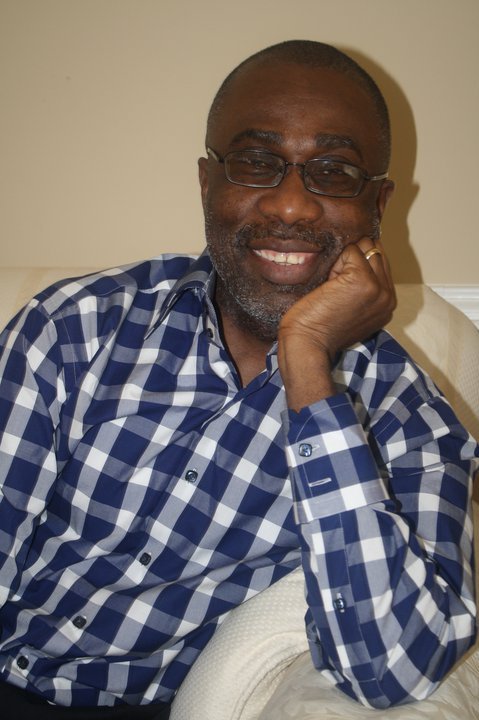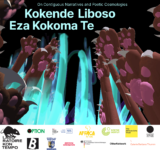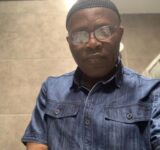“The West has made stars out of Diaspora writers and made them Africa’s voices. I have a problem with that.” Ikheloa Ikhide
Interviewed by Emmanuel Iduma
I have not always agreed with Ikhide Ikheloa. So when I received an invitation from Bakwa Magazine to have a short conversation with him, I figured that I could formalize my disagreement. Yet, as is clear from this conversation, an almost irrefutable sincerity pervades his work. He might be the true digital native, the tireless literary wanderer. I fear that he is relying too much on an unanthologized social media; but then, again, is why, in retrospect, we might consider him a forerunner in a new mode of responding to our literature.
Ikhide R. Ikheloa writes non-stop on various online media. Besides his blog at http://xokigbo.wordpress.com/, he has a weekly column in the Daily Times of Nigeria where he holds forth and offers unsolicited opinions on any and everything. He ran a weekly column in the Next newspapersfor three years until it was shut down. Ikheloa is notorious for having strong opinions about the literature of Africa. He refuses to write a book because he stubbornly insists that the book is dying a long slow death.
Emmanuel Iduma: I believe you consider yourself a reader, not even a critic. Why that distinction
Ikhide Ikheloa:I consider myself a reader, writer and consumer. The term critic as applied to me is often a charge leveled at me by those unhappy with my views of certain books. It also minimizes my work as a writer of creative pieces. I think people should simply relax, I am not Abiola Irele, let’s get that clear. People take me a lot more seriously than I am willing to take myself. I am a consumer, I buy books and if I am sufficiently motivated I share my views after consuming the product. Many have chosen to call me a critic; however, what I do is probably a lengthier version of what you will find in online bookstores, readers extolling or excoriating a work. I do concede that I have very strong opinions and I am not shy to share them. By the way, readers have always shared their opinions of books, in beer parlors, book clubs, etc. The Internet and social media simply make it a lot easier to reach a wide audience. The digital world has democratized the reading and writing culture. Writers are suddenly finding themselves being held more accountable publicly than ever before. I am excited to be part of that movement to democratize the literary culture. I should probably start charging for entry into my Twitter and Facebook space. Now, that’s a fundraising idea…
Do you think that there’s a part of you that’s inextinguishably Nigerian, but which has been Americanized?
Yes, absolutely. We are the sum of our experiences. I am not the Nigerian that left home many years ago. When I visit home, when I read about home, I am reminded that for good or bad, Nigeria has moved on – without me. And yes, I constantly worry that perhaps I am imposing my (alien) cultural values as a Diaspora writer on the Nigerian cultural space.
Regardless, I was born a Nigerian, will always be Nigerian, there is a mysterious bond with Nigeria I cannot, and do not wish to sever.
To ask that question in another way, and hopefully to elicit another response: have you ever considered that your version of reality, your version of being Nigerian, has changed with immigration? And is there any reason not to be concerned about this consideration?
I have reflected on this quite a bit. I think that living in the Diaspora, so far away from home, for such a long time creates distortions that are then amplified in our opinions of Nigeria. African writers abroad have been immensely valuable in shining a much needed light on many of Africa’s anxieties. Many have also written beautiful literature, to be honest. My concern is that the West tends to look to Diaspora writers for judgments (mostly negative) about Nigeria, indeed all of Black Africa. This is because they are more readily available and accessible than writers at home. This is a problem and not even the democratization of our literature by the Internet has helped it. The West has made stars out of Diaspora writers and made them Africa’s voices. I have a problem with that. So, yes, my version of being Nigerian has definitely changed with being away for so long. People should stop reading Ikhide, the more I think about it.
I’m thinking of what David Levi Strauss said about critics – that critics are not specialists. How does this sit with you? What do you try to achieve with a review?
It is true that critics are not specialists. Art is not science, everything is subjective. The best that anyone can hope for is to read a book and provide commentary with integrity intact. Folks have called what I do reviews or criticisms. If you read me closely, I actually use the book as a medium, an excuse if you will, to provide commentary on my own anxieties about how we do the business of what passes for our life’s journeys.
Are you working on any book? Is it even necessary for you to have a book?
Yes, daily, I work on three books – my blog, my Twitter and Facebook accounts. I have no desire to write a book, what I have to say, I simply say. Every now and then someone asks me to contribute to a book and I humor the writer, so in that sense, I guess you could say I am published. I think the contents of my email box would make for fascinating reading, all that darkness compiled in a book, don’t you think? I am thinking in my will I should authorize one of you young ones to have access to my mailbox and do with it whatever you need to do.
Recently I began to formulate the idea that we are geniuses in this age – how is it that we are able to express many thoughts at the same time? That while our fingers respond to chat messages, our mind composes emails, replies DMs, accepts friend requests, and then contemplates on the synopsis of an essay. Could this be the meaning of ‘digital nativity’?
Obviously the ability to multitask in our heads has always been with us; today’s technology allows us to share it more openly. I cannot tell you how many times as a little boy I multitasked in my head in the presence of my dad. My mind would travel elsewhere while he tortured us with his world view. Today, my kids simply whip out their smartphones and type “dad is babbling again! smh!” I paid for the smartphone – and their insolence. The term “digital native” I used to like and parrot a lot until I realized that being digital is being alive. Delete the “digital” and simply be a native – of our world, no big deal.
One of the struggles I’ve had, reading your reviews, has been the nagging feeling that you summarize the creative process of writers in sweeping commentaries. I wonder how you will respond to this?
The charge of sweeping commentaries as in generalizations is the easy refuge of those who are exasperated by my views. I have obviously struck several nerves for which I am gleeful. I advocate relentlessly that we step out of the clichéd box of traditional thinking, to re-examine how we tell our stories and to redefine ourselves and acknowledge the sum total of our journeys as part of our identity. I know several “African writers” who have not stepped foot in Africa in decades. They are viewed as experts on African stories. I have a problem with that. Ikhide should also be writing about his America.
How will this generation of writers (those whose first books began to appear a decade after the turn of the century) differ from the previous? I’m asking this taking into consideration the problems of defining ‘generation’, even the polemic that might surround that word.
Again, the problem is that we continue to look at writing from the standpoint of “books” and “generations.” Such linearity does a grave injustice to our stories. I think that comparisons are inappropriate, when you consider the disparate eras. Technology and the Internet have greatly redefined our literature for good or for bad. Ignoring those variables is not helpful. One observation I will concede: Today the writer as priest is morphing from the sage on the stage to a gentle guide by the side of the reader. Hierarchies are disappearing as readers and writers duke it out on the e-playground. By the way, any writer that does not have a twitter account is not serious.
Perhaps you are irregrettably subjective? Is this a way to describe your slant to books, literature, even life?
One must always take a stand, one must always be subjective. One must strive to be fair. Yes, I am subjective, guilty as charged. You would not be talking to me today if all that spewed forth from my mouth was objective and neutral pablum.
And this subjectivity could be an attempt to capture the truth of our collective human experience?
I seek a conversation about what you call “our collective human experience.” If I have been successful, it has been worth it.
Which writers did you grow up reading? I’m certain that list has changed.
The writers of my childhood are too numerous to narrate here. Everyone knows that Ikhide can hardly write a paragraph without mentioning Chinua Achebe. I revere him, Ngugi Wa Thiong’O, Flora Nwapa, and all the gang of the African Writers Series of the past. There are of course lots of Western writers that I am too embarrassed to admit to reading publicly. The library of my secondary school was my refuge, the vehicle that transported me all over the world through books. I should also tell you about my father’s cupboard, a magical library that contained several books that I read over and over again. More importantly, outside of Achebe and this army of wordsmiths, my greatest influences have been the oral thinkers of my childhood, toiling on the gritty streets of my life’s experience. If I am not known as a plagiarist, it is because their works are not written down, fortunately.
Why would a relationship with your family matter when your life is considered in retrospect? I’m trying to understand how your family, the love you express, helps in resolving the ‘conflict’ that is yourself.
Great question. Writers are notoriously poor at relationships and if there is anything that I share with that tribe, it is that I am not the easiest person to be with. I think that my lover and children are brave souls to put up with my neuroses and my demons daily. I do not believe in heaven and hell but if there is a heaven, I hope they have front row seats. I’ll be the imp grinning and waving at them in hell at Fela’s side. I want to be wherever Fela is. Anywhere else would be hell.
I doubt that the careful reader of your commentaries will fail to notice your sincerity, however unreservedly unapologetic you might sound. If you agree with this, what accounts for that outlook?
I can afford to be sincere and unreservedly unapologetic. I am not really your traditional writer. I have a professional occupation that pays my family’s bills and quite honestly, I have been away from the unnecessary roughness that is Nigeria for a very long time. True courage resides back home. I don’t know that I would have this attitude if I was in Nigeria trying to make a respectable living as a writer. In Nigeria, honesty and courage are expensive habits.
Have you ever been scared that a book will alter firmly rooted notions? Or do you approach books, even the endless web links you surf, with a shameless openness?
I am actually hoping that a book will alter whatever firmly rooted notions reside in my head. I like to think that I approach every work with boundless curiosity, an open mind and a willingness to learn something new. I understand from reading what many have to say about me, that many believe the opposite.
What do you think of Occupy Nigeria? Will you support a project to anthologize that (in)famous week?
I am proud of what Nigerian youths did with #OccupyNigeria. There is a huge disconnect between the ancient ideals of our rulers and the reality on the ground. Our rulers are not used to being held accountable. #OccupyNigeria exposed them as mostly thieving vacuous minds. I regret that so many lives were lost; however, our nation was put on notice: Things are going to change. That exciting week is already anthologized on Twitter and on Facebook. Simply go to #OccupyNigeria and everything you need is there. We do not need yet another book that no one will read.
Emmanuel Iduma is the author of Farad, a novel. He is the initiator of Gambit, a conversation project with emerging African writers on The Mantle.







Quintessential Ikhide-ism. Good stuff!
”Baba has spoken again” – this is a serious and interesting conversation! ”Iduma you sef do well”
One thing I admire most is how Pa Ikhide ( I’ll nick name him ”e-baba”) encourages literary creativity, hard work and originality through his reviews.
What separates Ikhide from others (regardless of what he does for a living) is tha he’s CONSCIOUS (as in Fela or Bob Marley). Unlike the self-hating fools that populate our government, academia and literati, the brother is comfortable with himself ( even with that “neurosis” thingy), and he LOVES Africa. It’s really that simple. That’s why his mind is such a treasure. May he live long.
WOW! That’s just the expression! Following Pa Ikhide on Facebook and up to this interview has really bettered my thinking!
Should I say he is so subjectively objective? His ways are just his own! I’m glad to be learning from him!
Sir Emmanuel Iduma, thanks for the intelligent and enlightening questions you brought to the table! I enjoyed the time out!
I appreciate Ikhide’s going back to his root and consciously stay connected with his e-writings. Young at heart and waxing strong. His truth about plagiarized unknown authors is sincere; they are flowers borne unseen and known through him; Ikhide’s e-writings illuminated them from dark archives. Arise and shine.